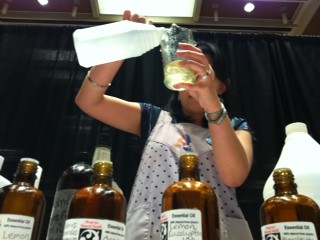Wondering what you can do that will make a difference in your life and the life of the planet? Start small and you are bound to succeed. Here are a few ideas for you to think about to help live healthier and happier in 2012. Choose pesticide free fruits and vegetables, switch your shampoo, have a clothing swap, cut out plastic and educate yourself!
Replace 2 of the "dirty dozen" you use the most with organic options. The "dirty dozen" are fruits and vegetables with the most pesticide residues and are the most important to buy organic. Organic are more expensive, but they are more nutritious, less toxic, better for ground water and ecosystem health, and often taste better! Plus, because they are more expensive, you are less likely to let them rot in your produce drawer, reducing your waste and carbon footprint, and increasing your intake of fruits and veggies.
Switch your shampoo. When you think about what personal care products you use the most in terms of frequency and amount shampoo probably tops the list. Many shampoos contain sodium laureth sulfate and related chemicals (which can be contaminated with known carcinogens), parabens (possible endocrine disrupters) and fragrances (which may contain allergens and carcinogens). When looking for a more environmentally friendly shampoo, check to make sure your "natural" shampoo does not contain any of these products, because greenwashing is common. If you have dry hair, look for shampoos with natural oils such as coconut and olive oil. If you have thicker hair, try shampoos with apple cider vinegar (or put in your own) to remove residue. Once you've conquerred your shampoo, find other ways to be toxic free by replacing personal care products with safer versions. Wannabe Toxic Free!
Have a swap. Swapping clothing, accessories or home items is a form of waste reduction, conserves resources and is better for your health. Many new clothes and furnishings contain chemicals that enter your body through your skin or lungs. Reducing the number of new items you purchase and bring into your closet and home reduces your toxic load. Moreover, swap parties are great ways to get to know your neighbours and make new friends!
Cut out plastic. Ontario has excellent recycling, composting, and reuse programs, but for most of us, the majority of our weekly garbage is made up of plastic - plastic wrap, plastic food containers, and other non-recyclable plastic items. These things do not easily degrade in a landfill. Avoid items that are packaged in plastic wrap and plastic containers. Use reusable produce bags. This will reduce waste, reduce air emissions from plastic manufacturing, and reduce your own contact with plastic, which when it comes in contact with oily or warm food, can leach harmful chemicals. Consider reducing the number of plastic containers you use, by making your own dips or salad dressings. They are much more delicious, healthier, and when you get the hang of it, easy to make.
Educate yourself. There are a number of informative and inspiring books and films about environmental stewardship and environmental health. Make a pledge to read a book or watch a movie a few times this year to help you learn about the issues and where you can make a difference. Join us! WHEN regularly screens films and reviews books which can be great sources of information. Or if you have recently seen an inspiring film or read a fantastic book and want to share it with others, tell us!
Contact our office with a review, or join the conversation on Facebook!
WHEN is a non-profit, charitable organization that works with communities on prevention initiatives addressing environmental links to health. To learn more about WHEN, click here.










